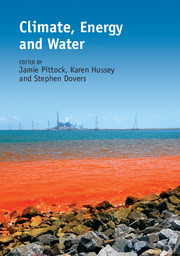Book contents
- Frontmatter
- Contents
- List of contributors
- Acknowledgements
- 1 Justifying, extending and applying “nexus” thinking in the quest for sustainable development
- 2 Water resources, climate change and energy
- 3 Implications of climate change for energy systems in a multisectoral context
- 4 Fossil fuels and water: A complex and evolving relationship
- 5 Renewable energy and water
- 6 Hydropower within the climate, energy and water nexus
- 7 Water and biofuels
- 8 Trade-offs and synergies between water and energy use in rural Australia
- 9 Management of the urban energy-water nexus
- 10 Managing the electricity-water nexus in China, France, India and the United States
- 11 Cross-sectoral governance of the climate, energy and water sectors: A ‘Rubik's cube’ analysis of cross-sectoral co-ordination
- 12 Regulation of the nexus
- 13 Climate, energy and water: the potential roles and limitations of markets
- 14 Strategies to mainstream climate change, energy, water and food security nexus knowledge and skills
- 15 A nexus of nexuses: systemic governance for climate response
- 16 Integrated modelling of the energy-water nexus in the American West
- 17 Biodiversity and the climate, energy and water nexus
- 18 Consumers, food supply chain and the nexus
- 19 Future prospects in climate, energy and water research and policy
- Index
14 - Strategies to mainstream climate change, energy, water and food security nexus knowledge and skills
Published online by Cambridge University Press: 05 April 2015
- Frontmatter
- Contents
- List of contributors
- Acknowledgements
- 1 Justifying, extending and applying “nexus” thinking in the quest for sustainable development
- 2 Water resources, climate change and energy
- 3 Implications of climate change for energy systems in a multisectoral context
- 4 Fossil fuels and water: A complex and evolving relationship
- 5 Renewable energy and water
- 6 Hydropower within the climate, energy and water nexus
- 7 Water and biofuels
- 8 Trade-offs and synergies between water and energy use in rural Australia
- 9 Management of the urban energy-water nexus
- 10 Managing the electricity-water nexus in China, France, India and the United States
- 11 Cross-sectoral governance of the climate, energy and water sectors: A ‘Rubik's cube’ analysis of cross-sectoral co-ordination
- 12 Regulation of the nexus
- 13 Climate, energy and water: the potential roles and limitations of markets
- 14 Strategies to mainstream climate change, energy, water and food security nexus knowledge and skills
- 15 A nexus of nexuses: systemic governance for climate response
- 16 Integrated modelling of the energy-water nexus in the American West
- 17 Biodiversity and the climate, energy and water nexus
- 18 Consumers, food supply chain and the nexus
- 19 Future prospects in climate, energy and water research and policy
- Index
Summary
Many of the chapters in this book have highlighted insufficient progress on sustainable development since the publication of Our Common Future in 1987. The chapters have discussed reasons for this and proposed policy and other reforms to try to ensure greater progress is made over the next twenty-five years than has been made in the previous two and a half decades. This is very important because urgent progress needs to be made. The latest science warns that unless urgent action is taken, our civilisation will, over the next two decades, pass irreversible climatic, hydrological and ecological tipping points, including
• irreversible global warming,
• over extraction of groundwater supplies, and
• irreversible decline of ecological resilience in many parts of the world.
Achieving the required rate and scale of change at the global, national and local level involves the informed participation of many actors: investors, business, government, educators, as well as citizens and communities. This will be hard to achieve given the current level of knowledge and skills, evidenced as follows:
• Investors and Climate Change: A global survey of the institutional investors, who recognise the risks of climate change to their investments, found that only 26 per cent of these asset owners have made tangible changes to their investment strategy or investment decision making as a result of climate risk assessments (IGCC 2011).
• Business and Climate Change: Whilst businesses can profitably cut energy and water costs and greenhouse gas emissions through investing in energy and water efficiency, the majority of Australian businesses, when surveyed, have said they had not made such investments. Of the reasons given, 40 per cent said that they “Did not know that they should be investing in energy efficiency” and 23 per cent said they hadn#x0027;t due to lack of skills and knowledge (Australia Industry Group 2012). Most small and medium-sized enterprises (SMEs) have not implemented energy efficiency opportunities in full.
- Type
- Chapter
- Information
- Climate, Energy and Water , pp. 231 - 252Publisher: Cambridge University PressPrint publication year: 2015
- 3
- Cited by



